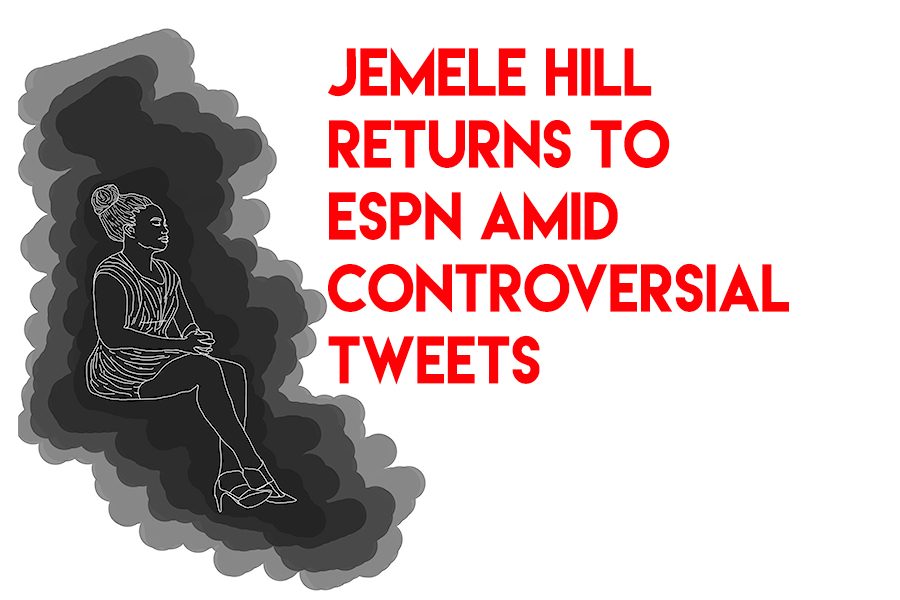Jemele Hill returns to ESPN amid controversial tweets
Following a social media incident that turned her into an overnight sports media sensation, journalist Jemele Hill has returned to the air after a two-week-long suspension from ESPN.
Hill, who is part of ESPN’s rotation of SportsCenter anchors, first drew attention to herself on Twitter by voicing her disdain for the Trump Administration.
“Donald Trump is a white supremacist who has largely surrounded himself w/ other white supremacists,” reads one of Hill’s tweets.
The issue drew more attention from the media when Press Secretary Sarah Huckabee Sanders labeled Hill’s actions a “fireable offense.” This sparked a widespread debate on freedom of the press in the U.S. and the extent to which a journalist may reflect her personal opinions, but this was only the tip of the iceberg.
Following comments made by Dallas Cowboys owner Jerry Jones stating that he would bench any player who refused to stand during the national anthem, Hill took to Twitter again to express her discontent. When asked by a follower people could do about the situation Hill suggested boycotting not just the Cowboys but their advertisers as well. For these comments, Hill was suspended from ESPN for two weeks. During that time, she did not use her Twitter account at all.
This play always work. Change happens when advertisers are impacted. If you feel strongly about JJ's statement, boycott his advertisers. https://t.co/LFXJ9YQe74
— Jemele Hill (@jemelehill) October 9, 2017
Within the sports world, Hill’s suspension has spurred discussion. Sports Illustrated wrote an article analyzing whether ESPN had legal precedent to suspend Hill, coming to the indefinite conclusion of “probably.”
Tulane students also weighed in on the issue, expressing concern for the rights of public figures on social media.
“It seems like public figures should kind of be allowed to express their opinions about stuff cause like, just using Donald Trump as an example and celebrities in general,” Tulane freshman Greta Mori said. “Just because she works there, it seems kind of messed up that she’s not allowed to express her opinion on her social media. Like when would that happen at another job?”
“From a moral standpoint, I think it was wrong of ESPN to suspend her,” sophomore Evan Doomes said. “Obviously they’re her employer, they’re a private company … they had the right to suspend her, but I don’t think that it was just … I think there’s a difference between what you’re allowed to do from a legal and business standpoint and what you should do.”
Fellow SportsCenter anchor Cari Champion and former ESPN anchor Lindsay Czarniak also expressed their disdain with the network for its decision. What seemed to stand out, however, was the comment former ESPN and current MLB Network anchor Robert Flores made on Twitter, implying that Hill was suspended because many of the Cowboys advertisers and sponsors were also tied to ESPN, and the network was worried her comments would be damaging to its profits.
“That always always always comes first,” read Flores’ tweet about the importance of ESPN’s capital.
Don’t mess with their 💰.
That always always always comes first.— Robert Flores (@RoFlo) October 9, 2017
The Cowboys have a large list of sponsors. One of the most prominent of these is AT&T, for which the Cowboys’ stadium is named. On the weekend prior to Hill’s suspension, more than 30 AT&T advertisements aired on ESPN. Other Cowboys advertisers, such as Ford, Nationwide and Papa John’s, also have ties to the NFL, meaning their advertisements air frequently on the network.
In the eyes of Flores and others, ESPN didn’t see Hill’s comments just as an expression of her beliefs – they were a direct threat to the network’s bottom line. Suspending Hill, then, was an action meant to send a message not just to Hill, but to her colleagues at the network: your free speech ends where our profits begin.
Ultimately, Hill accepted responsibility for her actions, returned to her spot on SportsCenter and assured her supporters that she is on good terms with the network. But the question still remains: how far are journalists allowed to go in expressing their opinions on social media?
Your donation will support the student journalists of Tulane University. Your contribution will allow us to purchase equipment and cover our annual website hosting costs.


















Leave a Comment